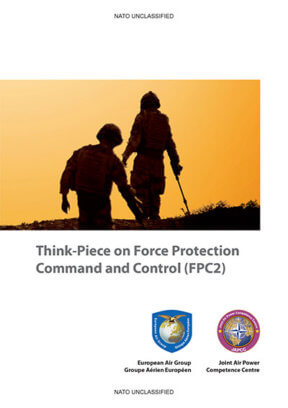Preface
The Airbase of the future will likely be a location where multiple nations come together to operate a wide variety of different air platforms, in substantial numbers. Furthermore, the capability, scarcity and cost of fifth-generation air assets will make such platforms increasingly high priority targets. Joint Air and Space Power is NATO’s asymmetric advantage and most likely what any future adversary will seek to degrade. Recent operations, as well as future plans, tell us that any airbase is also highly likely to be a headquarters location and a logistics facility, providing theatre enabling capability and quite possibly an operating base for other components. This combination of factors quickly creates a strategic asset that could very easily be the military Centre of Gravity (CoG). The inescapable conclusion is that the Airbase of the future will be a high priority, high-value target for any adversary, whether that adversary be a state or non-state actor.
Debates rage regarding the likely nature of future conflict. However, it is safe to state that all of our nations are facing an increasingly broad spectrum of threats from a broad cast of actors. Additionally, the diverse locations of airbases mean that they are not always just land-based environments and may also be impacted by littoral or riverine factors. Given the strategic nature of airbases and the vulnerability of most, if not all of the assets grouped on them, it is apparent that the methods of protecting them will have to become much better. As a key component, this process will require dedicated, air-minded Force Protection (FP) forces that are specifically trained and organised for the task.
It is acknowledged that we live in a resource-constrained environment. However, it should be robustly argued that too much focus is placed on the cost of Air FP, when the actual focus should be the significantly higher cost (human, materiel, strategic, reputational etc.) of a failure to adequately invest. That said, nations must make the most of what resources they have, and investing in intellectual development and critical thinking should be a priority if future adversaries are to be outwitted and ultimately out-fought. Few, if any, of our nations are now capable of ‘going-it-alone’ therefore creating constructs to which all can contribute or ‘plug and play’ is not just sensible, but essential. The FPC2 Think Piece offered here may be considered as the ‘Capstone Document’ of the ‘Standardisation of FPC2 Documents’ project. It provides the generic start-point from which we can develop over the coming years a multi-national, air-minded, responsive, scalable and agile FP capability that will be effective yet resource-efficient. If embraced now, it will help to make the participating nations ‘Operationally Compatible’; moving forward and when fully-developed, it should deliver true interoperability.
We hope that you find this document useful as well as informative and your comments are not only welcomed but encouraged.











